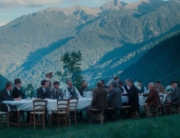Fill the Void feels like a folk tale set in a rural village. These folk dress and live bound by tradition as if they were in 19th century Eastern Europe, but their community is the middle of modern Tel Aviv, they take airplanes to visit family overseas, and text on cell phones. They can make individual choices, so that despite their modest and uniform dress, strong personalities prevail.
Writer/director Rama Burshtein, who became religiously observant after attending film school, creates a fictional, close-knit sect of ultra-Orthodox Jews whose lives, she notes, are as obsessed with marriage and parental social expectations as the characters in a Jane Austen novel. The family matriarch, Rivka (Irit Sheleg), has every reason to be happy with her two daughters. Twenty-eight-year-old Esther (Renana Raz) is lovingly married to Yochay (Yiftach Klein) and is about to have their first child. Eighteen-year-old Shira (Hadas Yaron) is excited to be approaching the final arrangements for her engagement to a young man from New York.
Then tragedy strikes and the family reels in grief at Esther’s death in childbirth. The distraught Rivka clings to her infant grandchild, and aggressively maneuvers reluctant family and rabbinical support to ensure that the baby will grow up near her. Talk about a guilt trip—her solution is to convince Shira and the older Yochay to marry each other. (Shades of Tudor England, where King Henry VIII claimed he acceded to his dying father’s wish to marry his brother’s widow.)
The slim plot is pretty much will they or won’t they? Shira is as independently determined as an Austen heroine to be more than an accessory in her mother’s plans or a convenient babysitter for Yochay. She insists on a real courtship to help her make up her mind. She also seeks advice from many people around her, from her elderly rabbi to her handicapped Aunt Hanna (Razia Israeli), who has reconciled herself to a life without marriage and children.
The charm is how, despite these pressures, a chemical attraction slowly and sweetly develops between Shira and Yochay. Klein, amazingly, manages to be as magnetic here as he was considerably more undressed in Nadav Lapid’s Policeman, while Yaron matches him with subtle expressiveness.
There have been recent films that sympathetically portray romantic relationships in the Hasidic community in Jerusalem, such as a married couple in Shuli Rand’s Ushpizin (2004), portrayed by Orthodox actors, and a surreptitious gay relationship in Haim Tabakman’s Eyes Wide Open (2009), portrayed by secular actors. Burshtein, in her first film for a general audience (she first specialized in making films restricted to women audiences), draws out the emotional communication by her secular actors, while setting them amidst extras from the Orthodox community for the convincing mise en scène.







Leave A Comment